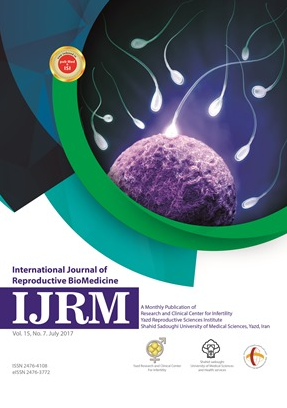
International Journal of Reproductive BioMedicine
ISSN: 2476-3772
The latest discoveries in all areas of reproduction and reproductive technology.
Reproductive function and pregnancy outcomes in women treated for idiopathic hyperprolactinemia: A non-randomized controlled study
Published date: Dec 21 2020
Journal Title: International Journal of Reproductive BioMedicine
Issue title: International Journal of Reproductive BioMedicine (IJRM): Volume 18, Issue No. 12
Pages: 1039–1048
Authors:
Abstract:
Background: Few studies have focused to determine the peculiarities of the course of pregnancy and pregnancy outcomes after treatment in women with idiopathic hyperprolactinemia.
Objective: To determine the peculiarities of the course of pregnancy and pregnancy outcomes in women treated for idiopathic hyperprolactinemia, with history of infertility and/or recurrent pregnancy loss.
Materials and Methods: A non-randomized controlled study was conducted at the Center for Reproductive Medicine “Universe” and Medical Clinic “Medhealth” during 2016-2018, involving 96 women with idiopathic hyperprolactinemia, aged 20-44 yr with infertility and/or a history of recurrent pregnancy loss. Prolactin (PRL), follicle-stimulating hormone, luteinizing hormone, estradiol (E2), free testosterone, and progesterone were studied in blood serum using immunoassay analysis method. Before the occurrence of pregnancy, hyperprolactinemia was treated with bromocriptine. Dydrogesterone was used to support the luteal phase.
Results: PRL levels decreased significantly and normalized within two-five months, regular menstrual cycle was restored in two-four months, ovulation was restored in three-seven months, and pregnancy was achieved in three-fourteen months. E2 and progesterone levels increased significantly (p < 0.001). Prior to the treatment, significant negative correlation between PRL and E2 (r = -0.386, p = 0.007), PRL and progesterone (r = -0.420, p = 0.003) was detected. Threatened early abortion prevailed among pregnancy complications. Pregnancy loss in the first trimester was recorded in 3.12% of cases.
Conclusion: Pregnancy outcomes in women with idiopathic hyperprolactinemia are improved by prolonged and continuous treatment with bromocriptine before pregnancy and administration of dydrogesterone in support of the luteal insufficiency.
Key words: Hyperprolactinemia, Pregnancy outcome, Bromocriptine, Dydrogesterone.
References:
[1] Saleem M, Martin H, Coates P. Prolactin biology and laboratory measurement: an update on physiology and current analytical issues. Clin Biochem Rev 2018; 39: 3–16.
[2] Crosignani PG. Management of hyperprolactinemic infertility. Middle East Fertility Society Journal 2012; 17: 63–69.
[3] Vander Borght M, Wyns Ch. Fertility and infertility: Definition and epidemiology. Clin Biochem 2018; 62: 2–10.
[4] Majumdar A, Mangal NS. Hyperprolactinemia. J Hum Reprod Sci 2013; 6: 168–175.
[5] El Hachem H, Crepaux V, May-Panloup P, Descamps P, Legendre G, Bouet PE. Recurrent pregnancy loss: current perspectives. Int J Women’s Health 2017; 9: 331–345.
[6] Arredondo F, Noble LS. Endocrinology of recurrent pregnancy loss. Semin Reprod Med 2006; 24: 33– 39.
[7] Kaur R, Gupta K. Endocrine dysfunction and recurrent spontaneous abortion: An overview. Int J Appl Basic Med Res 2016; 6: 79–83.
[8] Palomba S, Santagni S, La Sala GB. Progesterone administration for luteal phase deficiency in humen reproduction: an old or new issue? J Ovarian Res 2015; 8: 77–91.
[9] Glezer A, Bronstein MD. Approach to the patient with persistent hyperprolactinemia and negative sellar imaging. J Clin Endocrinol Metab 2012; 97: 2211– 2216.
[10] Adra A, El Zibdeh MY, Abdul Malek AMM, Hamrahian AH, Salaheldin Abdelhamid AM, Colao A, et al. Differential diagnosis and management of abnormal uterine bleeding due to hyperprolactinemia. Middle East Fertility Society Journal 2016; 21: 137–147.
[11] Goyal A, Ganie MA. Idiopathic hyperprolactinemia presenting as polycystic ovary syndrome in identical twin sisters: A case report and literature review. Cureus 2018; 10: e3004.
[12] Chen H, Fu J, Huang W. Dopamine agonists for preventing future miscarriage in women with idiopathic hyperprolactinemia and recurrent miscarriage history. Cochrane Database of Systematic Reviews 2016; 7: 1–24.
[13] Hirahara F, Andoh N, Sawai K, Hirabuki T, Uemura T, Minaguchi H. Hyperprolactinemic recurrent miscarriage and results of randomized bromocriptine treatment trials. Fertil Steril 1998; 70: 246–252.
[14] Passos VQ, Souza JJ, Musolino NR, Bronstein MD. Long-term follow-up of prolactinomas: normoprolactinemia after bromocriptine withdrawal. J Clin Endocrinol Metab 2002; 87: 3578–3582.
[15] Hekimsoy Z, Kafesciler S, Guclu F, Ozmen B. The prevalence of hyperprolactinemia in overt and subclinical hypothyroidism. Endocrine J 2010; 57: 1011–1015.
[16] Turankar S, Sonone K, Turankar A. Hyperprolactinemia and its comparision with hypothyroidism in primary infertile women. J Clin Diagn Res 2013; 7: 794–796.
[17] Kulshreshtha B, Pahuja I, Kothari D, Chawla I, Sharma N, Gupta Sh, et al. Menstrual cycle abnormalities in patients with prolactinoma and drug-induced hyperprolactinemia. Indian J Endocrinol Metab 2017; 21: 545–550.
[18] Lee DY, Oh YK, Yoon BK, Choi D. Prevalence of hyperprolactinemia in adolescents and young women with menstruation-related problems. Am J Obstet Gynecol 2012; 206: 213–218.
[19] Molitch ME. Endocrinology in pregnancy: management of the pregnant patient with a prolactinoma. Eur J Endocrinol 2015; 172: 205– 213.
[20] Carp H. A systematic review of dydrogesterone for the treatment of threatened miscarriage. Gynecol Endocrinol 2012; 28: 983–990.
[21] Carp H. A systematic review of dydrogesterone for the treatment of reccurent miscarriage. Gynecol Endocrinol 2015; 31: 422–430.
[22] Kumar A, Begun N, Prasad S, Aggarwal S, Sharma S. Oral dydrogesterone treatment during early pregnancy to prevent recurrent pregnancy loss and its role in modulation of cytokine production: a double-blind, randomized, parallel, placebocontrolled trial. Fertil Steril 2014; 102: 1357–1363.
[23] Mirza FG, Patki A, Pexman-Fieth C. Dydrogesterone use in early pregnancy. Gynecol Endocrinol 2016; 32: 97–106.
[24] Dante G, Vaccaro V, Facchinetti F. Use of progestagens during early pregnancy. Facts Views Vis Obgyn 2013; 5: 66–71.